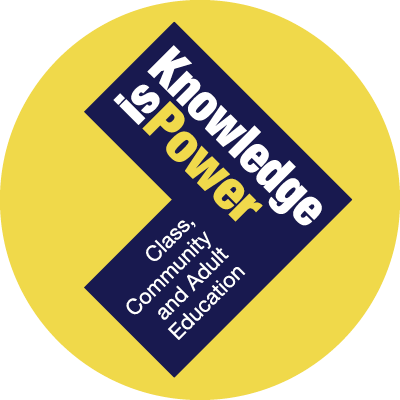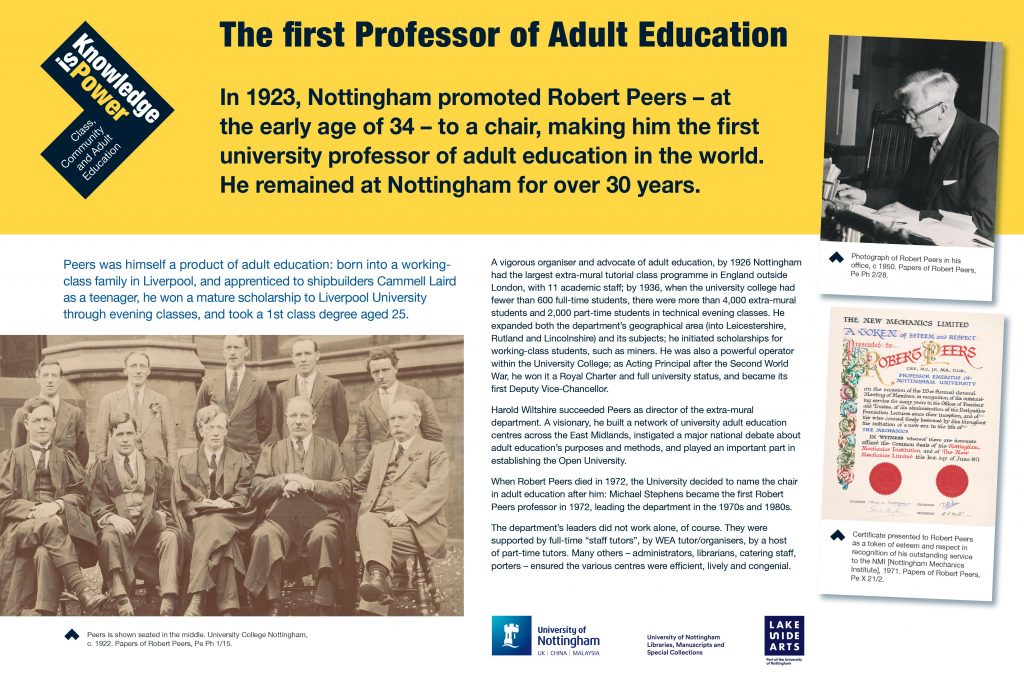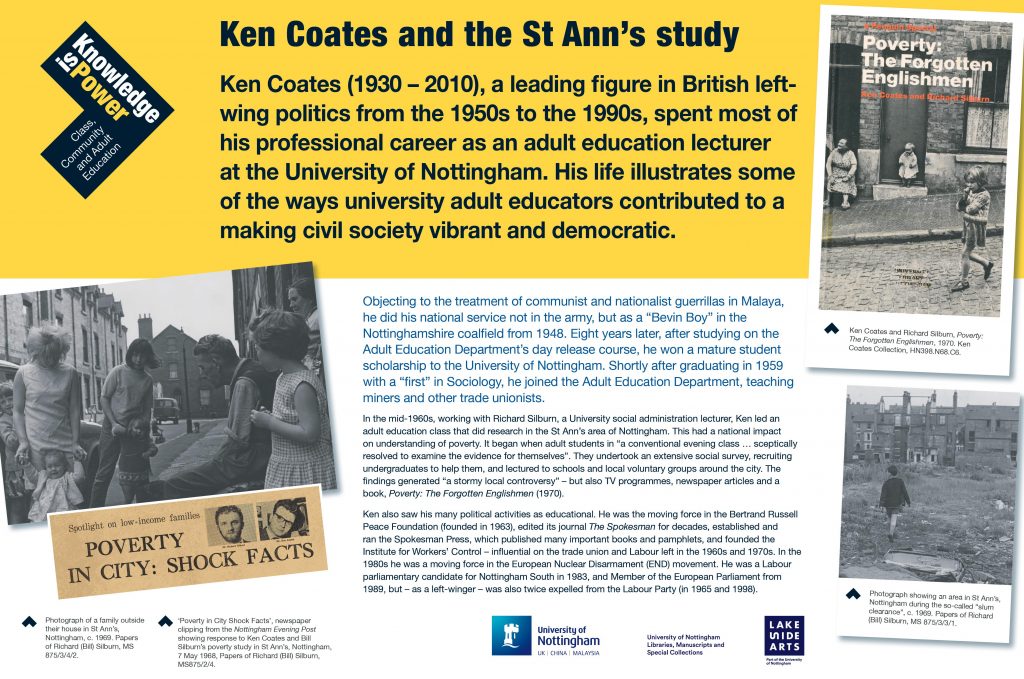June 27, 2023, by Kathryn Steenson
A grand day out from Rochdale to Nottingham via Aachen: to Know Power
 This is a guest post by Helen Chicot, Reform and Prevention Lead at Rochdale Borough Council
This is a guest post by Helen Chicot, Reform and Prevention Lead at Rochdale Borough Council
It honestly felt like an act of rebellion. In our little Whatsapp group, we half-joked about what the dress code might be (opting for “radical chic with arty vibes”) and took care to plan the snacks for the journey, essentials all covered: water, mints, Percy pigs, glasses wipes… And off we went. Four out of 5 of us having managed to successfully extricate ourselves from the ridiculous work and personal challenges we all currently find ourselves in for one glorious day of enrichment: a vital trip to the exhibition, “Knowledge is Power: Class, Community and Adult Education”, University of Nottingham.
Four out of five servants of local government: all of us proudly working class and determined to do right by people in our work. We had come together as a group collaborating with colleagues in Aachen, Germany: part of an international exchange supported by the German Government through the excellent DVV International. We deal with matters of employment and skills, policy, community safety, reform, prevention and equalities in our day jobs. But we all value education deeply, in our own ways and for our own reasons, we share the view of the Centenary Commission on Adult Education who are holding the flame for adult learning over 100 years since the publication of the Adult Education Committee’s final report in post First World War Britain:
“Adult Education must not be regarded as a luxury for a few exceptional persons here and there… it is a permanent national necessity, an inseparable aspect of citizenship and therefore should be both universal and lifelong.”
Our group has been so struck by this given understanding amongst our colleagues in and around the Volkshochschule, Aachen: that learning is just intrinsically good and is an important function of a local municipality to ensure its availability.
It doesn’t take much consideration or imagination for anyone to understand that there’s more to learning than its constituent parts: more than any of the qualifications that mark its presence and more than the mental health, trust and cohesion outcomes that are left in its wake. It feeds and invests in the soul: manifesting in our identity, our consciousness and our relationships. If ever there was a silver bullet that makes most things better, it’s learning: of course it is! But it’s so difficult to maintain an understanding of that in policy amongst the noise of the busy transactions in public service – in part because its benefits don’t sit neatly within the realms of one policy space. By nature, it is without boundaries, and yet all these “parts” of local systems are so busy trying to integrate, they fail to see what’s right under their noses. We needed to immerse ourselves in the rich history of adult learning and to validate that nebulous truth; we needed to be in company with an expert. And so we were fortunate that our tonic came in the form of Professor John Holford who met us in a very noisy café and tried very hard to understand why these four people from Rochdale Borough Council were so excited to have come to his exhibition: a tardis-like expanding mass of knowledge and power in the Lakeside arts centre.
It celebrated many things through telling the story of the work of the “extra mural” work of Nottingham University, instigated by Professor Robert Peers, who set up a sprawling adult learning provision across the Midlands with the support of the Workers’ Educational Association (WEA): developing what became these great, democratised spaces, tutorial groups and circles, distributing the power to release all the good things.
And we saw, laid out, this “understanding of the great issues of life” (the words of Professor Harold Wiltshire, Peers’ successor as head of Nottingham’s adult education department) through the sorts of collaborative funding structures we can only dream of in local government these days, demonstrating a shared and sustainable investment in that intrinsic value of learning from multiple sources through carefully hand drawn diagrams. In this wonderful magic room, John Holford has curated the story of these “schools of democratic citizenship” over the last 100 years. We saw the flame we must keep alive.
We also saw Aachen! We knew there was a German connection but none of us, and certainly not John, were ready for the excitement upon seeing an exhibition board stating:
“After the war, Professor Robert Peers saw adult education as a vital part of our post-war construction, and in 1947 invited a delegation from Germany to see the provision at the University to use as inspiration in the establishment of an adult education course in Aachen.”
That flame passed to Aachen in 1947 and they have done such beautiful things with it – what joyful connection!
The exhibition showed us, so clearly, how the power of learning, democratised and shared through institutions like the University of Nottingham, the WEA and our own Cooperative movement, suffered from the derision and undermining of cynical and ill thought through policy in the 1980s and 90s. No wonder it’s so hard to get it noticed amongst all the noise and obfuscation… But we learned of Plebs’ League! Who, along with others, saw the power of independent working class education and took their place as its protectors.
So what do we do? Well we learn our way forward, of course! Adult Education has enormous potential in the times we’re in: the work of Ken Coates’ adult class which influenced national debate about poverty in the 1960s is as relevant as a methodology today as it ever was: those participatory spaces and places where people come together to discuss and share their knowledge about the things they care about? They exist in Rochdale and in many other places, despite everything. And they matter a lot.
No comments yet, fill out a comment to be the first



Leave a Reply